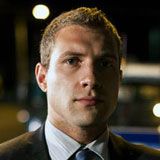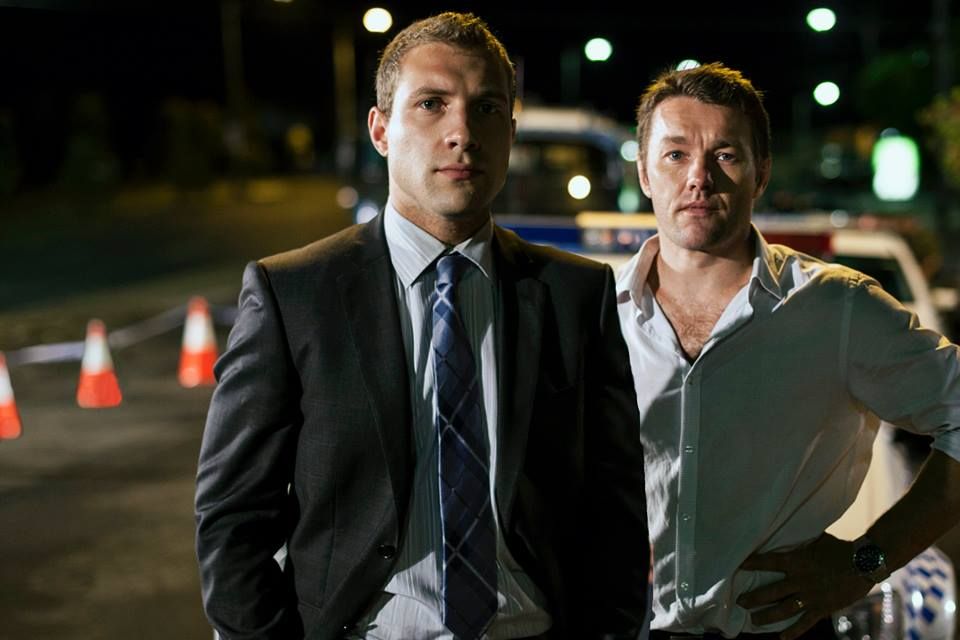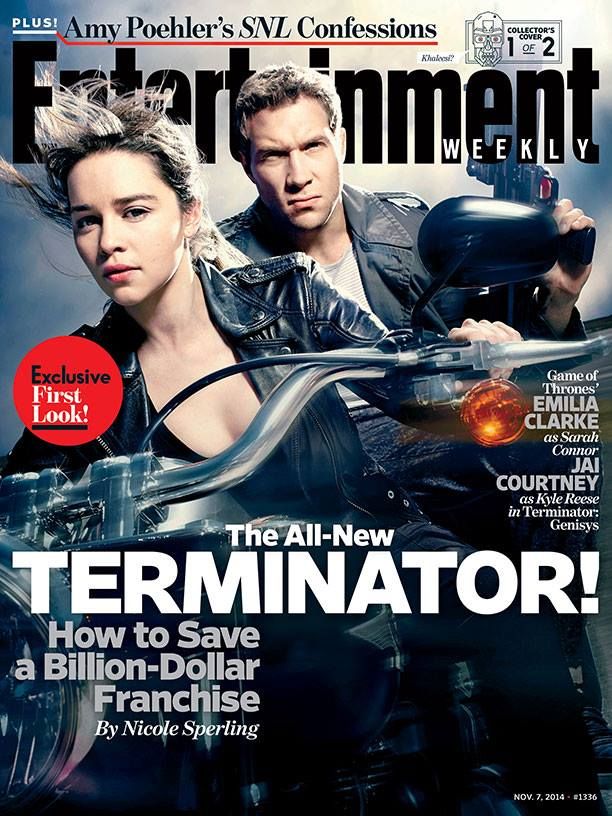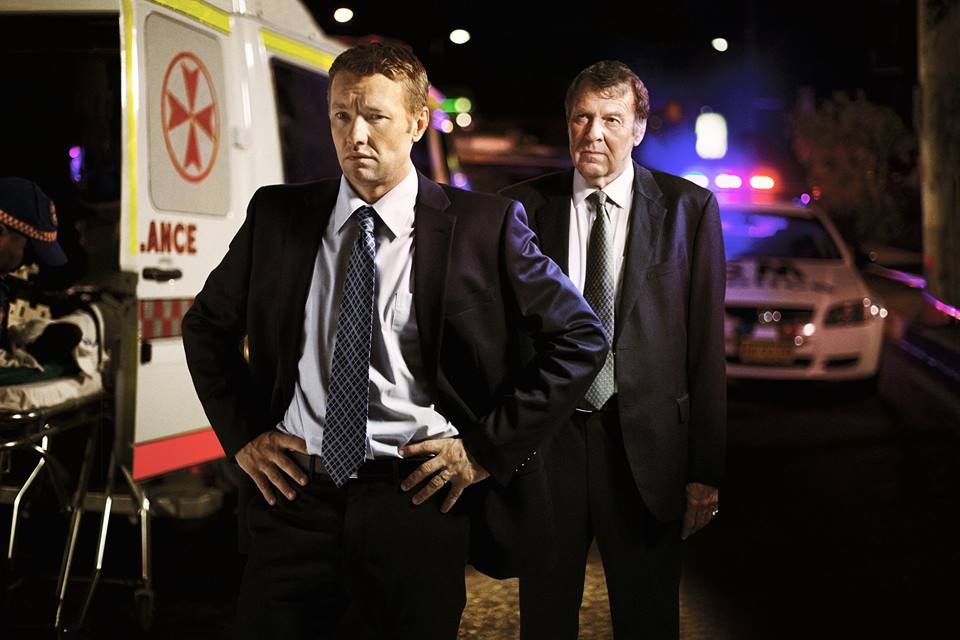Australian actor Jai Courtney arrived in Hollywood with guns blazing, literally and figuratively.
Since finding his footing in U.S. films, Courtney has appeared in a number of high-profile, big-action projects, including Spartacus: Blood and Sand, Jack Reacher and A Good Day to Die Hard. But before he headed off to film what may be his biggest blockbuster-style film to date – the highly anticipated reboot Terminator: Genisys – he returned home to shoot Felony, an intriguingly moody crime drama with a screenplay written by his co-star Joel Edgerton. And while Courtney plays a police officer, no guns are drawn.
In director Matthew Daville’s thriller, the 28-year-old actor plays an honest young cop with deep suspicions about an otherwise-heroic detective (Edgerton) who claims to have discovered a hit-and-run accident involving a child, but was actually responsible for it. As Courtney’s character digs for the truth, his efforts are blocked by his veteran partner (Tom Wilkinson) and complicated by his own dangerous attraction to the victim’s mother.
Speaking with SPINOFF, Courtney reveals why he wanted a detour to tackle a project more concerned with intimate human drama than with widescreen spectacle. He also explains what the Terminator franchise means to him, teases what to expect from the next installment, and recalls how he felt when he met Arnold Schwarzenegger.
Spinoff Online: When did you get the call to be in Felony
Jai Courtney: I knew nothing about this. My agent called me. I was in Budapest at the time, getting close to finishing A Good Day to Die Hard, so going back a couple a years, and my agent phoned and said, “Read this script. Joel Edgerton has written it, and I think it’s wonderful.” It was the very early stages at that point, and she’s very good at getting on things early, and she said, “I’m not going to tell you anything about it. Just read it and call me.” I’d been aware of Joel’s work – I was a fan of his from way back, but we didn’t know each other at all. So I was immediately intrigued and just smashed through the script and was immediately on the phone figuring out: “How do we get that conversation started? How do I get in front of the guys? How do we convince them that I’m the bloke to play Jim?” And there was little to no awareness from them, at that point, as to what I was up to, but the timing was quite good, None of these films had, I think, released at that point, but I had Jack Reacher under my belt, I’d just come from Australia doing I, Frankenstein, and then was now doing Die Hard. You’re kind of building this experience and that was, I think, instrumental in actually winning me the part. It wasn’t a decision for them where it was like, “Oh, well he’s an obvious choice because there’s box-office attraction,” or something. I was absolutely unknown – completely anonymous – and I had to educate them on what I’d been up to. But I insisted upon putting a tape down, and Matthew and myself and Joel and myself had some great conversations, just about the world and the character and how they saw him. Yeah, I sent an audition and they kind of liked what they saw and that was that, we got into chats.
Having gotten your foot into these tentpole-style films, was there anybody in Hollywood saying, “Don’t go do that little film in Australia”?
Not at all. Look, I can understand where that idea might come into play. There’s examples of things where you would want to take that advice, but I think with a script like Felony, it was just no question. The caliber of actor that Joel is, and I don’t think Tom [Wilkinson] was locked in at that point, but they were attracting interest. And so I’d seen Matthew Saville’s previous work. He did a film a few years earlier called Noise, which got some attention internationally but probably not as much as it was deserving of. And I think anyone educated in the creative industry knows a good opportunity when they see one. Felony was the perfect chance to go home and make something really special. And for me, the tentpole thing – this was exactly the side-step from that that I was aching for, at that point. I’d been working for the best part of the year straight and really wanted to step away, put the guns down for a second and explore some drama. And I felt I had the capacity as an actor to do that, and I wanted to show my chops, really. And a story like this comes along. I would’ve fought tooth and nail to make this happen, so I’m glad the guys felt like I fit into that landscape. It remains one of my most treasured professional experiences to date, and I’ll always talk about the fact that you really don’t need $200 million to have that much fun. And I do enjoy doing the kind of tentpole thing, but if I can shake it up and make a movie on this scale, every now and then, then I’d be really happy.
Are you like Joel? Are you attracted to the entire filmmaking process beyond performance?
Somewhat. I mean, Joel’s in a position where he’s been around a little bit longer than me and he’s been writing for a long time, and that’s not really something that’s in my background. I would certainly love to have some element of creative input in the future. I’ve dabbled with a few little things, but to me, that’s something that’s just going to come with experience. Yeah, there is that ambition, but I don’t really feel equipped yet with the skill, or perhaps the drive, to really make that happen. I think I’m still figuring out this acting thing, and it’s a bit of a one-step-at-time thing for me. Look, in 20 years I would love to direct a movie. It would be great to see a script get made or develop projects, and I think those things are within reach, but I’m in no rush to do it all. That’s for sure.
And then stepping back into big-scale – I’ll try not to torture you with Terminator: Genisys questions that are spoilery, but I’m curious where that franchise stood in your own estimation before you got involved.
I think I’d seen T2 about 100 times as a kid, quite honestly – it was something my sister and I watched all the time on VHS, and I can still go back and get a lot of entertainment out of that film. So it was cool. Look, I’m ever the skeptic when it comes to reboots, sequels that are deep down the line. I mean, I’m not naïve to the fact that I’ve been part of a couple now, but when I read the script for Terminator and understood what they were trying to do, my skepticism eased and it fast became something that I wanted to be a part of. I think it’s a smart concept, and they’re definitely pressing reset more than just digging up things we know about it and this and that. I think it’s convenient in a sense that when you’re talking about time travel, the possibilities are kind of endless, as far as going back over history. But it was interesting for me, and, look, yeah, this is a big movie. Trust me – the scope and scale of it is massive, and it’s very ambitious. But I think the creative team they assembled was second to none, and the cast are fantastic – really well-rounded out. And yeah, I was glad to be a part of it, man, so I’m wishing everyone all the best in editorial as we speak, while they pull that one together. I’m excited.
As somebody who watched T2 as many times as you have, what was the effect that meeting and working alongside Arnold Schwarzenegger had on you?
I mean, it was cool! The moment for me came in the cast read-through when we were doing that, and he may or may not have said some very iconic lines that we may or may not be familiar with, and that was really one of those moments, when you’re like, “Holy shit – here we are making Terminator!” I’m desensitized somewhat to the podium you might place individuals on for their notoriety or recognizability. I think I’ve been around just long enough to realize that when it comes to the acting game your colleagues and your castmates and usually the people that are the one you want to hang out with are the ones that know that and just want to get on with the job. So as far as being star-struck or having a pinch-myself moment, I don’t really know that happens too often anymore. It’s more about, you know, it’s cool. And you can have a laugh about it and share a story with your friends. I’m very grateful for the opportunities I’ve had. I’ve had a chance to work with some of my real heroes creatively, and I hope that continues.
Where are you as far as finding that next quieter, more subtle film?
I’ve got a couple of films in the can. Unbroken is definitely an epic, coming out at Christmas time, but I did a movie earlier in the year, as well, with Russell Crowe directing, called The Water Diviner, and it moves along, but the nature of my character is another departure from this action-heavy stuff that seems to keep happening, and that was great. And also telling another Australian story, and playing an historical figure, was really interesting for me, so I’m excited about that. But I’m always looking. Sometimes I feel like tonally you want to shake things up, and it doesn’t necessarily mean you have to bring it down – but sometimes I think the fewer explosions the better. It’s a case-by-case basis. I’m about to go and do a movie in New Orleans called Man Down, which is a really interesting exploration and sort of comment on what’s happening today with war vets, and I think it’s really relevant and that’ll be interesting to pursue, talking about those sorts of issues. And yeah, we’ll see. I think it’s probably time I did something people can laugh at. I wouldn’t mind ticking the comedy box real soon.
Working with your Unbroken director Angelina Jolie, who’s obviously one of the most famous people on the planet, what was the interesting thing to find out about her as a colleague, as a person?
Honestly, I think it’s how warm and genuine she is. You get used to meeting people of a certain stature who have a guard up, somewhat, and it’s not hard to understand why. Some people of that level, they live in an alternate universe, and they can’t go and get coffee, and they can’t drive themselves to the shops, and it’s about so much more that their life gets complicated in trying to maintain privacy, and it’s not hard to understand how some of them get wound up in the trappings of that and end up withdrawing. I think the interesting thing was that she’s not like that at all. She really is what-you-see-is-what-you-get, in a way. She’s a lovely, warm, open-hearted individual, who’s incredibly smart and incredibly in touch with truth and storytelling and what’s going on in the world. At no minute did I feel like we were just making that movie, because she felt like it would be fun to direct a movie. You know what I mean? She’s, I think, developing a really strong voice from the other side of the camera, and I think we can expect some seriously exciting things from her. Unbroken I haven’t seen yet, but from what I have seen of it, it looks fantastic. She deserves a pat on the back, because I think you can interpret that as something else, when someone that famous is in the directing chair, and I think she’s doing it for the right reasons.
Do you have an affinity for these actor-directors? You’ve worked with a number of them now.
A couple now – yeah, it’s interesting. It was definitely amusing to be involved with, almost, those two projects simultaneously with The Water Diviner and Unbroken. I don’t think a director needs to have a background in acting to be good at what they do. There’s so much involved in directing that has nothing to do with the performance. That’s just another element, another one of those building blocks, but it’s certainly cool to work with people that do know what that’s like, and know the impact of their approach, on an actor and how they prepare an actor to deliver what they need onscreen. So it’s been pleasant, so far.
Playing in select theaters, Felony is also available on iTunes.




